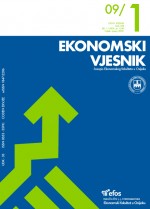Ruralni prostor i društvena struktura - novi identitet Slavonije i Baranje
Rural area and social structure – new identity of Slavonia and Baranja
Author(s): Antun ŠundalićSubject(s): Business Economy / Management, Agriculture, Rural and urban sociology, Human Resources in Economy
Published by: Sveučilište Josipa Jurja Strossmayera u Osijeku, Ekonomski fakultet u Osijeku
Keywords: rural area; Slavonia and Baranja; educational structure; professional structure; village; town; new identity;
Summary/Abstract: Industrialization and its role in stimulating modernization in the second half of 20th century changed the picture of village regarding dominating activity and professional structure of village population and new quality of social relations respectively. Slavonia and Baranja, being traditionally the most rural areas in the Republic of Croatia, also meet with the changes not only through marginalization of agriculture in total social development but also through changes of rural area. It can be followed through the changes of educational and professional structure of village population, through their understanding of life quality in the village and in the town as well as through the perception of the contents characteristic for the village and town. The village also met with the change of relations toward nature that is more and more exploited but less maintained. The techno-centric and pragmatic one replaces nature-centric and eco-centric dimension of rural life. How much such a reality has been accepted among the inhabitants of this area and how much they still live in the traditional characteristics of the region was expressed by the desire to learn while working in the field itself. The research carried out in twenty villages of Slavonia and Baranja and in the city of Osijek partly confirms such changes and their acceptation among the inhabitants but also denies the thesis that the future of this region is outside agriculture at least in the opinion of respondents. However, the reality is a change of identity of the region what the environment has already perceived and what the inhabitants have gradually accepted within the region. A part of the research results carried out within the frame of the project “Posttransitional Identity of Rural Area in Slavonia and Baranja” will be shown in this work.
- Issue Year: 22/2009
- Issue No: 1
- Page Range: 11-22
- Page Count: 12
- Language: Croatian

